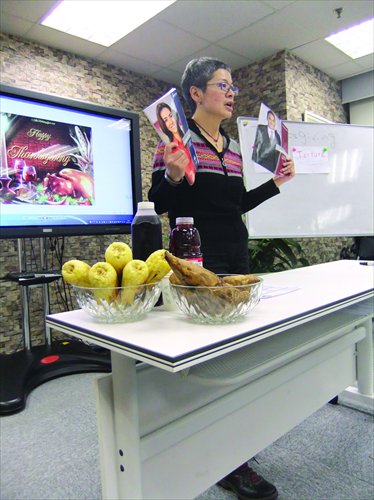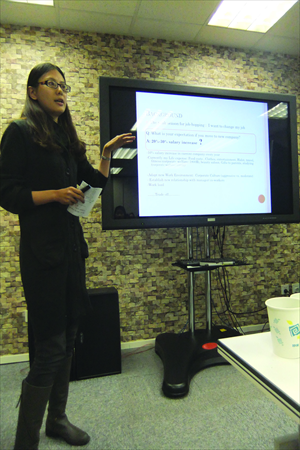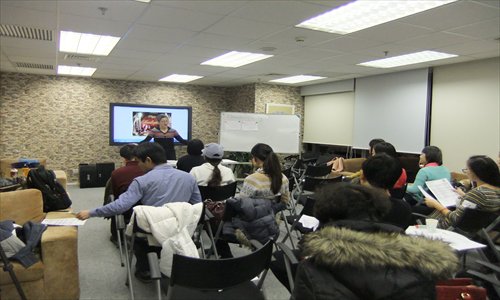Toast of the town

Porsher Cheung, founder of the Beijing Toastmasters Club, displays manuals for members at a meeting. Photo: Lin Kan Hsuan/GT
It was the moment Zeng Ming had been waiting for, but as he walked on stage toward the podium he felt his pulse race and mouth turn dry. Zeng, a 23-year-old student at Beijing University of Posts and Telecommunications, was preparing to deliver his first speech in English for Toastmasters International, a nonprofit educational organization that helps members improve their public speaking and leadership skills.
Despite feeling cold feet as he stared into a sea of faces, Zeng persisted with his speech. He stuttered at the start, but made it through to the end and received a round of applause. Nearly a year on, he continues to participate in the group's weekly gatherings.
"I desperately want to overcome my fear of delivering an improvised speech on stage. This has driven me to continue attending [Toastmasters International] events for a year," Zeng said. "I've found out that not only have I gradually overcome my fear of public speaking, but also enhanced my confidence in other areas of my life."
Founded in 1924 in California, Toastmasters International today has nearly 300,000 members in more than 130 countries. It has more than 40 branches in Beijing alone, two of which are bilingual. Porsher Cheung, founder of the Beijing Toastmasters Club, one of the branches, wanted to promote the organization in the capital after she finished her MBA at Dowling College in New York a decade ago.
"I wanted to introduce this system here because it seemed a perfect way for people to master their abilities in leadership, communication, language proficiency, human relations, time management and so on," said Cheung, an energetic woman in her 40s. "Some white-collar members attend our events because they feel relaxed in the surroundings. They like the sharing and bonding [the club] offers." Besides open clubs that welcome members from all walks of life, there are also exclusive Toastmasters clubs associated with multinational tech giants including Microsoft, Lenovo and Oracle.
"[Employers] consider club meetings as training sessions for their employees," Cheung explained.

Jane Li, a member of the club, delivers an impromptu speech on happiness. Photo: Lin Kan Hsuan/GT
Reasons for joining
In September, Taiwan businessman George Yen was appointed international president of the organization. Yen is the first Chinese to hold the presidency, which is rotated every year.
"I have long believed that Toastmasters International has unique insight by using public speaking in a supportive environment as a means of achieving personal empowerment," said Yen, who speaks four languages and is the board chairman of a Taipei-based trading company. "Self-confidence is the byproduct of an empowered person and an essential quality in a leader."
Cheung said many American members join Toastmasters International for social as well as professional reasons. "The purpose isn't about giving presentations or performances, especially in regular residential communities. Members probably just want to make some social connections in their leisure time," said Cheung.
Brian McMahon, a senior member of the organization from Australia, claimed he was lured to the club to improve his impromptu speaking skills. "Even though I still feel some trepidation before being called up [to speak], it is a terrific buzz to run with a topic and entertain the club," he said. Unlike most members who learn about the club through a friend, Zeng was introduced to Toastmasters International by a book he read about creating Microsoft PowerPoint presentations.
"It really was a coincidence for me," he laughed. "Because some speakers at Toastmasters International combine their talks with PowerPoint presentations, it's been quite useful for me to learn both skills."
Zeng, who last week hosted Toastmasters International's meeting at the Safety Hotel in Chaoyang district, said the club is all about pushing you to "step out of your comfort zone."
Running like clockwork
Every Toastmaster International meeting in Beijing runs for two hours under a strict format. Besides the host, known as Toastmaster of the Day, there is an ah-counter, who counts the number of times each person uses unnecessary filler words; a wordsmith, who presents a word for participants to learn and use in their speeches; a timer, who records the length of each person's speech; a table topics master, who helps members improve speaking spontaneously by asking them to talk for one to two minutes about a random topic; and an evaluator, who provides oral and written feedback.
An extremely tight schedule at each meeting means there is no time for speakers to waffle, said Zeng. "In my view, the timer holds the most power," joked Zeng. "He or she strictly obeys the schedule and will ring their bell once a speaker's time is up. Even the host Toastmaster has to comply with the rules."
Before a conference starts, participants are given two leaflets: an agenda and an evaluation form, the latter which has several blank columns for feedback to be written about speakers.
"Evaluating is the most important part of Toastmasters International meetings. Speakers often get quite encouraging feedback or suggestions from other members," Cheung said. "This is also what distinguishes us from ordinary English corners. You can speak in public at both forums, but you'll only get evaluated at a Toastmasters International event."
Beijing's two branches that hold meetings in Chinese and English are the Beijing Bilingual and Hutong Bilingual Toastmasters clubs.
"English is just the language we choose for communication. Members have many more important purposes for joining the club," said Zeng, who is also a member of the Beijing Bilingual Toastmasters Club. "Even when you deliver a speech in your mother language, it can still make you nervous."
Members are given two books upon joining the Toastmasters club: manuals in competent communication and leadership, which Cheung said are required to be read prior to attending meetings.
"Learn-by-doing is our rule of thumb. We also have American members [in Beijing] who have benefited from the program a lot," she said.
Aside from witnessing personal development, seeing other members grow in confidence can reaffirm people's sense of belonging within the organization.
"Whenever I meet committed Toastmasters, I often ask them about their passion that has kept them in the group all these years," said Yen. "A surprising number of members reply that it's the joy of seeing people's grow and transform."

Members of the Beijing Toastmasters Club attend a meeting on Thanksgiving Day. Photo: Lin Kan Hsuan/GT
More listening than talking
To celebrate Thanksgiving Day which fell on November 28, around 30 Beijing Toastmasters Club members attended a conference in Sanyuanqiao, Chaoyang district, that used the American holiday as its theme.
Pauline Pan, who acted as wordsmith, nominated "torture" as word of the day. Table topic speakers had to deliver a two-minute speech about the festival with the key word included in.
"It was quite interesting that Pan chose a seemingly contrasting concept for Thanksgiving Day," said Lily Ling, a 22-year-old first-time speaker at the meeting. "She might want us to thank those people or tough experiences that, although once seeming like torture, have made us more mature."
Ling chose to speak about her preparation for her English proficiency exams before she studied abroad, which earned her the best speaker award at last week's meeting.
But not everyone is swept up in the charm of Toastmasters International. Audrey Song, 32, said she probably wouldn't attend future events because there is "too little time to talk on stage."
"I admire the preparation the club makes for each event and the feedback from others," said Song, who has attended three meetings. "But I think the host talks too much. It seems to be a training exercise for our listening comprehension more than anything else. I never feel nervous about speaking in front of people, but I need to practice spoken English as much as possible."